
As Bible Quiz celebrates its 50th anniversary, we look back at the faces that made the game great. To honor the history of this outstanding program, a committee of Bible Quiz historians has selected “50 Greatest Quizzers of the First 50 Years”. Quizzers are included from every decade, highlighting the greatest quizzers and programs of the last half-century. Due to the minimal data available from local competitions, only performance at National Finals competition was considered.
The criteria for the list centered around three questions:
- How good were they at the time?
- How good are they compared to other quizzers of their era?
- How long were they good?
Obviously, the list started with far more than 50 quizzers, so there are excellent quizzers who did not make the list. The committee looked for impact and longevity, while balancing the various eras of Bible Quiz. To that end, the committee considered statistics, looking strongly at all aspects of performances at National Finals, including team placement, individual scoring, and, where it was available (from 1986 - current), the one-on-one/individual competition results. Consideration had to be given to the era in which a quizzer competed, as the rules, qualifications, and questions have varied widely over the decades. Further, full sets of historical data for Nationals even as recently as 2003 is incomplete, and much of the statistical data before the 1980s only lists the top five to ten quizzers. Unfortunately, this lack of information could result in some great quizzers being left off the list. However, this project has been active for quite some time, and every effort to contact anyone related to Bible Quiz from every decade has been made. The good news is that there are either statistics (in part or whole), or multiple contacts from each year of National Finals, whether they were officials, coaches, quizzers, or spectators who noted certain top statistics, hopefully making any exclusion rare.
Many of the aforementioned differences make it impossible to directly compare quizzers from different eras. Thus, a quizzer’s dominant presence and ability to compete at a high level against the toughest available competition played a decisive role.
The ultimate purpose of this list is to recognize the rich history and tradition of Bible Quiz. While there is room for discussion as to who should be included, one thing is certain: Bible Quiz has seen some extraordinarily talented young people. These quizzers have demonstrated significant achievement and their accomplishments are worthy of the utmost respect.
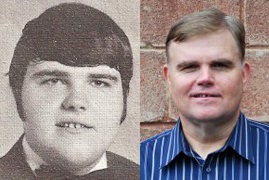
Baird, David
David Baird quizzed for Ebony A/G in Ebony, Virginia from 1972 to 1976 and quizzed three years at national finals. In 1973, he led his team to a national championship over the Gospel of John. Two years later, David was the top scorer at national finals in 1975. His final year at nationals, 1976, he placed what is believed to be 2nd high scorer in one of the most competitive national finals of the 1970’s. Competitors remember David as an impressive quizzer who never let up, going toe-to-toe against every top scorer. His consistent dominance at the quiz table was unwavering from 1973 through 1976. He was often high scorer at tournaments, and everyone knew a game against his team, regardless of the level of competition, was going to be hard fought. In an era when only one team from each region moved on to national finals, there is broad agreement that the years David’s team placed 2nd at regionals left one of the best teams in the country out of the running for the championship.
When he became the national top scorer in 1975, David earned a reputation for his uncanny ability to successfully interrupt questions at such an early point that it seemed impossible that he would be able to complete and answer them correctly. This took place at a time in Bible Quiz when the questions were not formulaic as they are today; thus, while there were still “key words” in many questions, the question writers were not restricted in how they could craft questions, and many would write questions that would appear to be going a certain way, and then the key word would take the question in a totally different direction. Such questions were known as “burn questions” and they were dreaded by every quizzer. Yet, David had an innate ability to tell where the question writer was going, and was rarely “burned” by such questions. He thus earned the moniker of “Super Quizzer” or “SQ” for his impressive abilities.
David continued to be involved with Bible Quiz for years, both as an official and official question writer in 1984 and 1985. Following graduation, David married Jo Ann Grizzle, another quizzer from Centreville, VA. He is currently lead pastor of The Life Church in Manassas, VA.
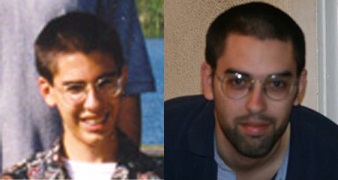
Bohanon, Joey
Joey Bohanon quizzed for the legendary Central A/G program from 1994-2000. He competed at Nationals five times, finishing as high as 4th in scoring his senior year. In 1995, Joey was a part-time starter on the team with Karl Dawson, Todd Katter, and Shaun Lotter. That team finished 6th in the challenging first year of NIV quizzing over the Gospel of John.
In 1996, Joey got his first chance to lead a team of first-year junior high quizzers. The so-called “second team” shocked everyone by qualifying for Regionals. There, thanks in part to the expanded Nationals field, Joey led his team to Nationals. In a year that offered tremendous learning, Joey’s team finished 21st, though Joey did score a perfect game at Nationals (something he takes pleasure in pointing out that Dawson never accomplished). Joey was the 17th high scorer as an 8th grader.
The 1997 season saw Joey move to the top team, quizzing alongside veterans Katter and Rowe. This team demonstrated great balance, finishing 2nd despite failing to place a single quizzer in the top 15 scorers. Joey was 19th overall, leading his team in scoring. He also placed 2nd in the Scholarship Quiz (similar to today’s east-west quiz) in one of the most interesting exhibition matches ever played at national finals.
Following a disappointing 1998 season (known at Central as “The Other Year We Didn’t Make It”), Joey bounced back nicely in 1999, finally cracking the top 10 scorers at Nationals. His 10th place finish gave him three top-20 finishes in four appearances. His senior year would tell the tale of his legacy.
Joey’s final Nationals, in 2000, saw Central finish in 3rd place, and Joey earn 4th in individual scoring. He also finished 3rd in the Individual Tournament. To read Joey’s memories from this National Finals in his own words, click here.
Joey’s skills as a hitter, his fearless approach, and his encyclopedic concordance knowledge made him a fierce competitor. Having the opportunity to quiz at Nationals from a young age gave him a wealth of experience and built his confidence. Even as a young quizzer, competitors could never overlook a team with Joey at the buzzers. His five Nationals appearances place him in a rare class, seeing as all but one of those came before the 40-team expansion.
Today, Joey serves as a popular question writer and quizmaster, as well as carrying the load as an administrator of biblequiz.com. He earned a PhD in Mathematics from Washington University in St. Louis, MO, and currently works for the US government.
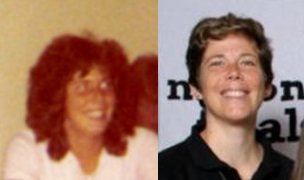
Brodin, Kari
For those who knew Kari during her years as a quizzer, no one will be surprised to hear that now, as back then, she embodied the ideals of Bible Quiz. As great a competitor as she was at the quiz table, with what was proved to be unbeatable poise, she made sure to be first to make new friends, encourage younger quizzers, and practice in word and deed what she studied. In 1980 she was asked by the District Youth Director to quote the book of Romans at District Youth Convention, which she did perfectly and with both passion and meaning, bringing the verses to life in front of an awed crowd. The subsequent interest in the program from youth pastors who had attended the convention led to more than doubling the number of teams in the Northwest District.
Quizzing twice at national finals between 1978 and 1981, Kari amassed an impressive record. Her first time at finals was with Evergreen Christian A/G in Olympia, Washington, where she placed as the 3rd highest scorer and her team finished 7th. She returned to national finals in 1981 on the team from Renton A/G, Renton, Washington, and proceeded to run the table, placing 1st in both individual high score (109.29 ppg) and the team championships. In fact, at the time, Kari had the highest individual average in the history of quizzing. Even more exciting was the fact that at the end of the national round-robin, three teams (Renton, WA, Lanham, MD, and Springfield, MO) were tied for first place, and Renton’s points forced them into a two-game playoff to win the title. During both matches Kari quizzed out with perfect 160-point games. In the final championship game, Kari waited for the 30-point question, commonly late in the set as was the norm at that time, which was question 19, to seal the game, and the championship, which was followed by a rousing standing ovation for a brilliant performance.
Kari was a picture of cool, calm, confidence on the buzzer. Even if you were fortunate enough to have her team on the run, she never seemed rattled, didn’t change her game plan, and somehow found a way to win when the odds seemed impossible to beat. She was a tough competitor but at the same time a very gracious and humble person. She was and is a blessing to everyone she comes into contact with, and it was said of her performance in the “all-star” quiz for the top 6 quizzers in 1981 that she seemed absolutely anointed when quoting from the gospel of Matthew. Kari is one of Bible Quizzing’s true stars – someone who earned her reputation as an outstanding quizzer, but then went on to live an exemplary life. She is the kind of person parents would like their own children to become, and thus serves as a true Bible Quiz role model.
Following graduation, Kari wrote for national finals in 1986 over I & II Corinthians, and coached Cedar Park A/G, Bothell, Washington at nationals finals from 2005 to 2011, leading them to four consecutive 2nd place finishes (a record), from 2006 to 2009. She earned her B.A. from what was then Northwest College, and went on to earn her Ph.D from Fuller Theological Seminary. She is now a professor at Northwest University, her alma mater.
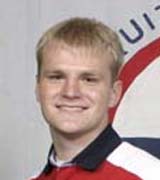
Brown, Peter
Peter was known by everyone in quiz for his quiet demeanor, friendly smile, and voracious desire to study and live out God’s word.
Peter quizzed at National Finals from 2000-2003 for two different teams from two different regions. He began quizzing with Tacoma Life Center, Tacoma, WA with Rich Nelson as his coach. Peter’s first year at finals, 2000 found his team quizzing in the Challenger Division where they finished 7th, and Peter was 2nd high scorer with 83.42 points per game. His Tacoma team returned intact to the 2001 finals where they moved up to the Championship Bracket and Peter finished 33rd with an average of 23.68. His coach said Peter had a natural talent for memorizing and retaining massive amounts of material, but chronically had issues completing questions. Playing against top quizzers at the 2001 finals, Peter said he felt forced to hit even earlier, but knew he was missing something that everyone else seemed to have figured out about hitting questions in the perfect spot.
In 2001, Peter’s family moved to California where Peter began quizzing for the team at Orange Hills. His coach quickly found that Peter would learn everything asked of him and was eager to practice, but he had never figured out the patterns the writers were using - not seeing that there were such a broad range of questions which always followed their own patterns. Explaining these patterns to Peter was like watching a light-bulb go off over his head and then explode. His coach, Mel Aou, proceeded to explain each non-generic type of question and reinforce it continually in practice. Peter’s entire outlook on studying changed. He started finding groups of difficult answers in the sections, chapters, and books, learning how many multiple part answers were available and how many consecutive verse complete answers/quotations there were. His ability to catalog so much material allowed him to often hit on the first sound of the first word of the question based on the opening remarks, knowing how many of which types there were in each area of scripture, which removed the guesswork. Having mastered not only the material but the styles, he became nearly unstoppable on 30’s and 20’s. He would study all week and then practice two days in a row on the weekend. The last three weeks before nationals in 2002 he put in approximately 50-60 hours per week perfecting his craft.
Peter had found two eager teammates in Ricky Haney and David Dorey at Orange Hills. Together they set a goal of winning a championship. At National Finals in 2002, Peter continued his amazing year of growth by helping his team win an undefeated championship (which had only been done once since expansion in 1984), and then going on to claim the high scorer title. He said he had dreamed for years about winning those titles, but never thought he would set records. The team tied for best record and finished with the 2nd highest score in the history of BQ. Peter’s only disappointment was that he hadn’t won the individual competition.
Peter returned to the 2002-2003 season without Ricky, who had graduated, and with a goal of tying the 2002 team and high score performance, and completing his dream for the individual competition. The year was plagued with long-term illnesses for Peter, and it wasn’t even certain that he would be up to quizzing at National Finals. In the end, he supported David, who was the team’s high scorer that year, and they finished with another undefeated championship. His goal of repeating as high scorer was dashed, but with a look of steely determination he doubled his efforts and took the individual competition title. His third goal accomplished, he graduated that year knowing he could master anything he set his mind to doing.
Peter later graduated from Grove City College and now lives in Arizona. He is currently contemplating going back to school for a degree in law or political science. In 2004 he consulted on a bestselling book about President Ronald Reagan’s personal faith and the impact it had on his leadership.
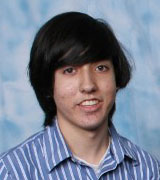
Burkhalter, Jared
Jared Burkhalter quizzed from 2003 to 2009 for Faith A/G in Orlando, Florida. His first year, in 2004 he was a substitute and only scored averaged 10 points per game. His team placed 7th that year. The following year, 2005, he was the top scorer on his team, averaging 53.95 points per game. His team placed 12th. He average 53.16 points per game in 2006 while his team placed 17th. The next three years both he and his team experienced major success. In 2007, he led the individual field, averaging 105.53, 17 points per game above the next quizzer. His team placed 6th. In 2008 he placed 2nd with a 106.32 point average, only 70 points behind the top scorer. His team ended up 4th. Finally, in 2009, he retook the individual title averaging 115.79 points per game and his team finished third.
As a younger quizzer, Jared was constantly trying to make himself a better quizzer, getting quite frustrated at not being about to break through into the top tier, despite countless hours of studying. Once 2007 hit, he took off like a pro and was nearly untouchable. He had to work very hard to quote clearly when quoting fast, and improved dramatically between 2006 and 2009. His last three years yielded impressive performances at nationals and secured his place on this list.
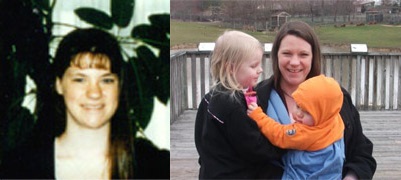
Daigle, Joy
Joy Daigle quizzed for Syracuse, NY in the mid-1990s. Her first trip to Nationals came in 1993 over the notoriously difficult Gospel of Luke. Her team finished 18th, and she placed 13th in scoring, all of which was a prelude to a fantastic Nationals career.
In 1994, her team jumped to 5th place, showing radical improvement in her second Nationals. Joy achieved 2nd in scoring, finishing only behind the legendary Lisa Wootton. Clearly, Joy had learned from her inaugural trip to National Finals.
The 1995 Nationals in St. Louis, MO was a quirky one, because it was the first quizzing over the NIV after more than 30 years of KJV quizzing. Joy handled the transition with excellence, leading her team to a 2nd place finish (Syracuse lost to Allison Park in a playoff match for first). Note that her team’s performance improved at each successive Nationals. In addition, Joy once again scored highly as an individual, finishing 3rd overall.
In her 1996 senior campaign, Joy only had one place to move up to continue her team’s legacy of improvement. Sure enough, Syracuse conquered all, winning the title with a 20-2 record. Her team won some tough games, including an impressive overtime win against host team Central A/G from Springfield, MO. Joy repeated her scoring finish from 1995, finishing 3rd once again.
Joy Daigle’s impressive four-year run as a Nationals quizzer demonstrated excellence and tenacity. Joy was feared for her ability to dominate games with difficult 30s and strong hits over tough questions. Her abilities as a quizzer and team leader make her a natural choice for the 50 Greatest Quizzers of the First 50 Years.
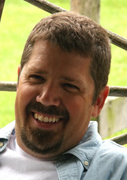
Davis, Sean
Sean quizzed four years at National Finals, 1981, 1983, 1984 and 1985 for Renton A/G in Renton, WA, missing only in 1982, when only one team moved on from both district and regional finals. One of his coaches remembers him as a “complete quizzer”, one who had come up through the ranks and learned the game at every level, which gave him the ability to be as dominate on 10’s as on 20’s and 30’s. More importantly, he was known as a quizzer who hungered more for the understanding of scripture than for the game itself.
Sean quizzed in an era (like a 38-year era) which many have referred to as “The Wild, Wild West” or “The Bad Old Days” of question completion. At this time, the official writer produced questions only for district through national finals, never writing any practice sets and never offering information about their style. Due to inconsistencies from question to question, it often could take 20 or more seconds just to complete the question, and the answers were extremely short compared to modern-day questions.
Sean and his team, with Kari Brodin as captain, arrived at National Finals in 1981 knowing they had the ability to win, but faced a tough field with more than a few teams capable of winning their own championship. His team finished in a three-way tie for first, and rather than letting nerves take over, approached the playoffs like a team on a mission. They won the National Championship, the first for the Northwest Region, and while Sean finished as 3rd scorer on his team, he dominated the 10-point quizzers. His captain remembers that without his points they never had a chance to win. Equally impressive was his ability, at a young age, to bring the team together through his verbal encouragement and can-do attitude at the quiz table.
The following year, 1982, was a year of rebuilding after graduating top quizzers. The team lost at regionals, but returned to National Finals in 1983 with Sean as the captain, and finished in 7th place. Much of the individual scoring data has been lost over time, but Sean led his team in scoring. At National Finals in 1984 a new format was used in which 16 teams competed in two groups of eight teams, which was followed by playoffs in each division and then between the two divisions to determine the winner. Sean’s team finished in a multi-way tie somewhere in the middle of the pack, but Sean moved up into the top ten, finishing 7th. His coach said he was the driving force behind this team in 1984 & 1985. “He was like having a second coach, and in fact I really only came on toward the end of the season to provide some support, it was his expertise, experience, drive, passion, and vision that led the team.”
Sean’s final competition, and strongest individual performance, was at the 1985 National Finals. He lead his team to a 3rd place finish and was the 3rd high scorer with 104.29 points per game. Although his average has been surpassed many times in the modern era with its more standardized question styles, at that time any average over 100ppg was considered quite impressive.
Following graduation Sean remained active in Bible Quiz as an official, question writer and coach, always looking for opportunities to give back to the program he loved. He graduated from North Central University, where he and Jerome Tang had coached the Farmington, MN team. Sean wrote the official questions in 1993 and was one of the first to offer consistent, quizzer-friendly questions that were easy to interrupt for those who were extremely well prepared. While the questions were easy to complete, his answers were the first to start raising the bar on long answers and concordance work. Moving back to the Northwest, Sean then coached at Renton A/G for a few years, taking them to Nationals in 1990. Sean is happily married with three children and again lives in the North Central area of the country, where he coaches his own children and serves as a very active lay leader in his church.
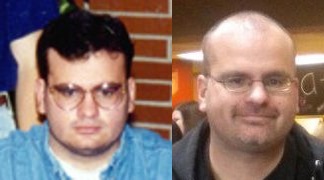
Dawson, Karl
Karl Dawson quizzed from 1990 to 1996 for Central A/G in Springfield, Missouri. After one year in B-league, Karl burst onto the national scene with a vengeance in 1992, placing 6th at national finals as an eighth grader, something nearly unheard-of in its day due to the inconsistency in question style, which often made the questions harder to complete than the answers.
In 1993, Karl placed 16th among a very tough field of competitors and over the most difficult-to-answer questions in the history of national finals at that time. He returned in 1995 where his team placed 6th and he placed 7th. In 1996, Karl finished his quizzing career going out with a bang. His team placed 3rd following a playoff and he placed 4th individually. His most impressive achievement that year was to set the record for quizzing-out forwards, doing so in 18 of 22 rounds, and smashing the previous record. What most may not know was that Karl attained these stats while rarely taking reread questions.
Karl seemed to possess what then would probably have been considered the “trifecta” of skills that allowed him to finish consistently among top scorers. First among these was a mastery of question and sentence structure, which allowed him to hit often by anticipating the key word well before his competitors. Add to that his lightning fast speed on the buzzer and the rare ability of being able to speak with clarity at extremely fast speeds, and you have a quizzer who is difficult to beat. Just when you thought Karl might have taken too long to complete the question or to get out the answer in time, or when you thought he might have over-hit the question, he would pull out the answer just in the nick of time.
Karl was also excellent at performing under pressure, and was a delight to watch in playoff situations, where his love for the challenge of “putting on a show” would come to full fruition. He is often remembered for his showmanship as much as for his talent, a rare thing to find in the often hushed world of quiz. One example that stands out is a game late in the rounds of 1995 national finals just before lunch, when both teams knew they were finishing out of the trophy positions. The other captain, being a common co-conspirator in Karl’s antics, decided that one or the other of them would not only attempt to contest every single question, but would also try to openly confer with each other the entire time the judges deliberated. What followed was one of the craziest games at national finals. The question style rarely used words from scripture and were vague enough to be open to additional answers. The judges were quickly perplexed by the complex arguments in the contests and the odd structure of the questions in the face of these arguments. At this point in national finals you could see the toll the constant contesting every round for completions and additional answers had taken on the judges throughout the competition, so it only added to the hilarity. They not only managed to contest nearly every question, which led to long deliberations, but talked incessantly to each other, made faces, stuck out their tongues, and used sign-language to confer during every contest without ever being fouled, no matter how hard they tried. It sounds crazy, but to this day both teams will say it was one of the true highlights of that year, if not their entire time in BQ. It is certain that the officials had a much less jovial interpretation of the events than the quizzers did.
Since graduation, Karl has been involved with quiz as a coach, question writer, blogger, trainer, and official. He currently works as a freelance editor/writer for Christian publications, and serves as one of the webmasters of this site.
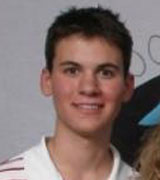
Dorey, David
Without any discussion, David’s name was picked by all of the people who worked on this list as an automatic entry into the top 50. Looking at his record it is easy to see why. David quizzed six consecutive years at national finals (1999, 2000, 2001, 2002, 2003, and 2004) and amassed the following records:
- Four national team championships - more than any other quizzer
- Three of those championships were undefeated (1999, 2002, 2003) - making them the most dominant team in history
- Three consecutive national team championships (2002 - 2004) - only one other team since expansion has ever been undefeated
- A 54-game winning streak in regular round play, from the 17th round of 2001 through the 13th round of 2004, an unfathomable feat that beats the next closest team by 24 games
- In 1999 he finished 15th individual high scorer on a team whose other members finished 1st and 10th - the highest three man finish in history
- In 2000 he was 9th on a team whose other member was 5th place
- In 2003 he was 2nd high scorer with an average of 105.53 ppg, on a team whose other members were 10th and 15th - the second highest three man finish in history
- In 1999 David’s team had nine games with scores of 300 or more points at national finals, beating the next closest record by eight 300 games.
- In 2003, his team had three 300-plus rounds, which is the second highest total in history
- In 2004 he was the high scorer with an average of 136.58 ppg - the second highest average in history
- In 2004, having moved from Orange Hills A/G in California to Church at Briargate in Colorado, he swept the national competition and is one of only two people who ever earned the “Grand Slam” of Bible Quiz, which is comprised of winning the team championship, individual high scorer, individual competition, and highest individual quiz-out forward percentage. The only other quizzer to do this was his 1999 team captain, Kent Piacenti
In fact, there is hardly a team or individual record that does not have David on the list. However, what only few knew was that David probably worked longer and harder than most of the top quizzers of his era. David had to put in more time, quote more, and review more often than any of the other high scorers on his teams. Having quizzed with Kent Piacenti and Peter Brown, both of whom made the learning and retention look simple, David succeeded only by personal competitive drive and being diligent to hardly let a day go by without quoting at least half, if not all, of the material, and review his concordance and chapter analysis materials whenever he had free time. This personal ambition led him to do whatever it took to help his team win, especially in 2003 and 2004. The result was that he was able to encourage other quizzers to realize that anyone can do the work if they put their mind to the task. To this day David credits quizzing with teaching him how to learn, memorize, and assimilate knowledge so much faster than most of his peers in college and law school.
Since graduation, David has been active in Bible Quiz through officiating and coaching. He says he keeps in close contact with many of his former teammates, considering them to be an extended family. He earned his Bachelor’s degree in political science from the University of Colorado at Boulder, as well his Juris Doctorate from the University of Pennsylvania Law School in Philadelphia, where he is an editor of the law review. While in law school, David supervised a legal aid program through the local District Attorney’s Office, providing legal help to battered women and children. In Autumn of 2012 he will begin working for one of the top litigation firms in Washington, D.C.
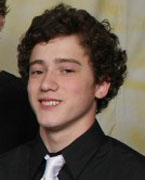
Duffy, Brandon
Brandon Duffy quizzed from 2003 to 2009 and has one of the most impressive resumes around when it comes to doing well at nationals. He started his nationals career in 2004, quizzing for Calvary Chapel in Seattle, WA for coach Kari Brodin, a quizzing great in her own right.
The following year, Brandon started quizzing for Cedar Park Church in Bothell, WA under veteran coach Kent Kloefkorn. After the 19 rounds of normal round-robin play, his team was tied for first place with Lexington, KY, each with only two losses. In the first national championship playoff in a decade, Brandon quizzed out and helped lead his team to the 2005 national championship. The next four years, Kari Brodin coached Brandon and his teammates to four consecutive second place finishes. In 2006, Brandon teamed up with his sister Jenna-Jo and they won another playoff for second place. They faced another playoff in 2007 for the championship, narrowly losing on the last question to Colorado Springs, CO, in one of the most exciting quiz matches of the decade (video of this match may be seen here). They finished second in 2008 and 2009 as well, breaking a 30-year old record for consecutive second place finishes. Collectively, his teams had a record of 82 wins and 13 losses in the championship division.
Brandon had a fantastic individual career as well, placing in the top 6 in the championship division five years in a row and making the final round of the individual competition from 2006 to 2009 (winning in 2006). From a young age, Brandon impressed crowds with his ability to complete questions with early hits, and he was a master of the concordance.
Brandon will graduate in May 2012 from Northwest University with majors in biology and environmental science.
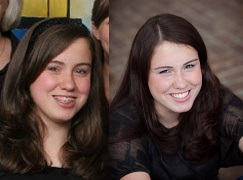
Jenna-Jo Duffy
Jenna-Jo Duffy quizzed for Cedar Park Church in Bothell, Washington from 2004 to 2009. Her team accomplishments nearly parallel her brother, Brandon. She quizzed on all four second-place teams (2006, 2007, 2008 and 2009), but was on Bothell’s second team in 2005. She is one of few second chairs included in this list because of her outstanding individual performances, placing 10th, 17th, 6th, 12th and 10th and making the final of the individual competition twice, winning in 2007.
While Jenna certainly never shied away from concordance questions, she was more at home with the standard “meat and potatoes” questions. Very fast on the buzzer, she could always be counted on for those two or three 20’s that can be crucial to a victory. She also had a personality that you couldn’t help but like. In 2009, when she qualified for the semi-final match of the individual tournament along with the Daniel, Jesse and Joshua Wagner, the three brothers formed a tight huddle before the match to pray. Completely unfazed, Jenna-Jo muscled her way in to the laughter of the crowd. This spirit of boldness and her many accomplishments earn her a place in the list of top 50 quizzers.
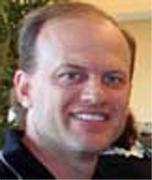
Freitag, Paul
Paul Freitag quizzed in the early 1980s for Bethel A/G, in Minneapolis, Minnesota. He holds the distinction of getting the first perfect match at national finals in regulation play (we believe one might have been achieved in a playoff earlier). This happened the first match of national finals in 1982. Paul followed this up with a 150 and 140. In the end, he finished in third, only 60 points behind top scorer Ken Henderson, but still breaking 100 points per game. His team finished tied for third. Paul returned the next year 1983 and repeated his third place finish with an average of 80.71 points per game. His team finished fourth.
Following graduation, Paul remained involved with quiz, as an official and a question writer, writing the official questions in 1987. He is most known today for the role he plays at nationals finals. For over 20 years, Paul has been the man the officials go to when a team appeals a decision. He knows the rules very well and is able to affirm whether the correct decision was made or not. It is also believe that at nationals this year, Paul will be the person with the most consecutive national appearances, having come every single year since 1982.
Today, Paul is Vice-President for Advancement at North Central University.
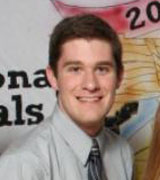
Galliers, Jon
Jon Galliers quizzed for First A/G, Lexington, KY from 2002 to 2006, with four appearances at national finals. Only starting quizzing as a 9th grader, Jon took to the game like a natural placing fourth place in the championship division his first year, 2003 with an average of 84.21 points per game. While his team placed 10th that year, the next three years were extremely successful for both Jon and his team. In 2004, Lexington won second place in a tense playoff match against Spring City, PA. Jon placed second, averaging 98.68 points per game. In 2005, they tied for first place, losing to Bothell in a playoff match. Jon led the scoring field with an average of 97.89 points per game. Finally, in 2006, his team placed fourth while Jon became the fifth recorded person in history to win back-to-back scoring titles. In addition, 2006 was the first year modern year in which five questions were required for a quiz-out instead of six, and Jon became the first person to quiz out every round of national finals at least since expansion.
It’s been mentioned before that many of the truly great quizzers have a natural talent for both memorization, concordance work and playing the game. Jon excelled at all of these. Even as a first year quizzer, he amazed audiences with his ability to answer concordance questions in a year that featured extremely difficult concordance questions. He was a very clean quoter and was able to hit questions very early due to his superior knowledge of the material. Moreover, his team was very friendly, both among themselves and to other teams and continues to be such under the coaching of Dave and Karen White.
Following quiz, Jon attended Eastern Kentucky University. In 2008, he married Bethany Laakkonen, another former quizzer. They have one daughter, Amariah.
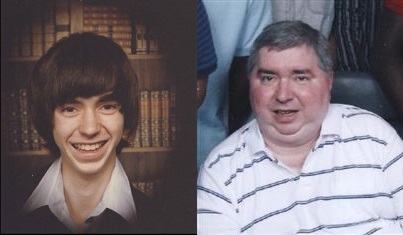
Gilmer, Mark
Mark Gilmer quizzed from 1974 to 1981 for Evangel Temple in Decatur, GA. These were the days when only one team from each region competed at nationals. Mark’s team competed at nationals in all of those years except 1974, 1977 and 1980.
In 1976 and 1978, Mark’s team won national finals, making them the first church to win three national finals (they also won in 1963). While much of the individual data from those years is missing, we do know that Mark placed among the top 6 scorers in both 1979 and 1981.
Mark was one of the most consistent and reliable quizzers of his generation; in every year that he quizzed, he earned a starting position on the team at a church that was known at the time for having a very competitive quiz program. Mark was also renowned for his ability to get his team back into matches in which they were behind by methodically and reliably interrupting 10 and 20 point questions at crucial points. He may not have been the high scorer on his team, but it was often his quiz-out on the critical 10s and 20s that made the difference in his team’s wins. He was also known for his incredible accuracy; Mark allegedly had the fewest errors among all of the top scoring quizzers at national finals in each of his 5 national finals appearances.
Following his quizzing years, Mark coached 12 teams at national finals from 1984 to 2010. Mark passed away on July 21, 2010 shortly after taking his team to nationals one last time.
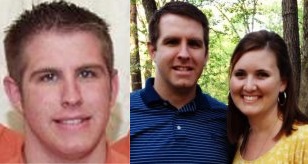
Haney, Ricky
Ricky Haney quizzed for Orange Hills A/G, Orange, CA from 1995-2002, starting in 6th grade and memorizing 15 books of the New Testament. Known to most of his competitors at the quiz table for his calm consistency, he was known during times of fellowship as a baseball fan and easy-going, all-around jokester. In an interview with his first coach, he was described jovially as the “thorn in my flesh, the messenger of Satan to torment me” and “the quizzer whom I had to drag through the book of Acts kicking and screaming”. On a more serious note, his coach remembers him as the “team’s needed jolt of humor and strength in what were many highly competitive situations throughout the years”.
Regardless of the various perceptions of him, he quizzed for a church, and team, that went on to break or tie every single record in BQ history. Often overshadowed by the captain on his 1999) Acts team (Kent Piacenti), in his first appearance at National Finals Ricky placed 5th high scorer with 82.17 points-per-game behind a captain who averaged 152.17 points-per-game. An amazing feat considering the fact that the 2nd - 4th high scorers, who were the top scorers on the 2nd, 4th, and 6th place teams, averaged only 2-4 more points per game than Ricky did. In fact, Ricky was not even first on re-reads that year - those were given first to the 3rd chair on his team (David Dorey) who had memorized all of the material, and who finished 15th place with an average of 46.74ppg. This was the highest three-man finish in the history of BQ, a record that stands to this day.
After a record-setting performance at 1999 National Finals, Ricky and his team, without graduate Kent Piacenti, set a goal to shoot for another championship. Secretly they would have been happy with any finish in the top five teams, which still seemed like a long-shot with only two quizzers. At the 2000 National Finals, Ricky again finished 5th high scorer as team captain, and led his team to 5th place, the highest two-man finish in BQ history.
While the 2001 Finals ended with Ricky in 9th place individually, and 9th in the team competition, for the first time he broke into the finals of the Individual Competition, finishing fourth.
The beginning of the 2001-2002 season brought a new quizzer to the Orange team, with Peter Brown moving from Washington to California. Although some thought bringing a new top scorer to the team would have disturbed the balance, Ricky and David quickly welcomed Peter and they became best of friends. The culmination of Ricky’s senior year in quiz was a second undefeated national championship, a feat accomplished by only two other quizzers ever (David Dorey & Peter Brown), both from Ricky’s teams. While Ricky’s scores were no longer the team’s highest, he and David finished 21st and 22nd respectively. Ricky said winning another team championship had been his big goal for ending his quizzing career on a high note.
Since graudation, Ricky completed a degree in education from Louisiana State University, and lives in Louisiana with his wife Beth and their beloved animals. He has been involved in quiz over the years as both a coach and an official. Ricky maintained his relationships with his old teammates and coaches, keeping in regular contact through phone, internet, and on various trips together. He has commented often that he doesn’t know where he would have ended up without the relationships he forged through quizzing, and that he has found the scripture to be a constant source of positive growth and encouragement, and an ever-present help in making life’s decisions, regardless of how small or large.
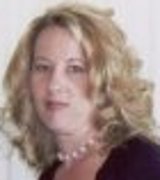
Hayward, Teri
Teri Hayward quizzed for First A/G in Tempe, AZ from 1984 to 1987. The only year we have her individual stats is 1986, where she placed 11th and averaged 64.33 points per game. That year was also the first year of the individual tournament, then played as a double-elimination one-on-one, and she was the first winner. In 1985, following the Final Four playoffs, her team placed 2nd, barely losing a playoff to Ypsilanti, MI on the last question. The following two years, in 1986 and 1987, they were back-to-back champions, going 12-3, then 14-2. These were also the first two years in which a 16-team round robin was played (with one extra team in 1987 due to a technicality).
The Tempe program was part of the superior run of the Southwest Region in the 80s. Teri was the leader of one of the top teams of that run, and her quizzing was key to her team’s victory. A pioneer of one-on-one quizzing, she blazed a trail that all the top quizzers follow, seeking similar glory. Teri Hayward earned her spot among the 50 greatest quizzers.
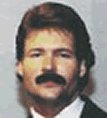
Henderson, Ken
Ken Henderson quizzed at nationals in 1981 and 1982 for First A/G in Tecumseh, Oklahoma. Ken led his team through one of the most dramatic “worst to first” turnaround transformations in Bible Quiz history. After losing every single one of their matches and placing last at the 1981 National Finals, his team returned one year later to win the 1982 Nationals in dramatic fashion, on the final question of the final round. Coming into that final round in 1982, Ken’s team from Tecumseh, Oklahoma was tied for first place with the team from Decatur, Georgia with identical 5-1 records. They faced each other in the last round, and in a very tight game in which the lead changed hands numerous times, the match came down to the 20th question. Decatur was leading, 120 to 105, with a single 20 point question left, and thus whomever took the final question would win the match and the national championship. In addition, although they did not know it at that moment, the captains of both teams (Ken, and Rhett Laurens from Decatur) were tied for top scorer with 760 points each, and thus the captain who took the last question would not only win a national championship for his team, but he would also win the individual top scorer award. Ken, who had been quizzing “in the zone” throughout the match, interrupted the question at a very early, seemingly impossible place, but he completed it without any hesitation and was correct. It was a quiz-out question, and thus the 20 points plus the 10-point bonus made Tecumseh the national champions over Decatur by a score of 135 to 120, and it also made Ken Henderson the top scorer over Rhett Laurens by a total points score of 790 to 760.
Ken went on to a highly successful career in the technology profession, becoming an SQL “guru” and publishing numerous books on the subject. Sadly, he passed away in 2008 and is greatly missed by many.
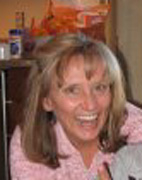
Heugel, Jodi
Jodi Heugel quizzed for Aurora, Colorado in the mid-1970s. She went to nationals once, in 1977. Her team was first place and she was also the top scorer. While we have typically restricted our top 50 list to quizzers with more than one nationals appearance, quizzers in the “eight team” days get a little leeway in this regard. Making nationals was an amazing achievement by itself. Not only was only one team from each region allowed to compete at nationals, but only one team from each district was allowed to compete at regionals. As such, many truly great teams never got a chance to even compete at nationals. The first Bible Quiz newsletter, ever, featured a bio of Jodi’s team following national finals. It may be read here.
Jodi currently lives in Colorado Springs, CO. Her daughters, Josie, Jordan and Janelle (pictured above) were all involved in Bible Quiz. Jordan was also a national champion, in 2001.
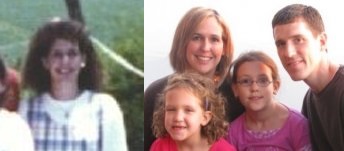
Johnson, Marcae
If the modern era of Bible Quiz began in 1986, Marcae was its first All-Star. In her three appearances, she finished 5th in scoring in 1986, 3rd in 1987, and 1st in 1988. Perhaps her most famous achievement was claiming both the high point quizzer and Individual Tournament titles in her senior year. This was all the more impressive considering that Marcae graduated from High School at 16 years of age.
Marcae was the catalyst for one of the most consistent programs in Bible Quiz. Central Assembly in Springfield, MO has sent more teams to Nationals than any other church in history. Beginning in 1986, Central sent eight consecutive teams to Nationals in an era where only two teams could qualify from each region. She led Central to three straight Gulf Regional titles, never finishing lower than 6th at Nationals, with a 2nd-place finish in her senior season.
After Marcae’s impressive performance at the ‘88 Finals, it took almost a decade for another quizzer to duplicate her feat. To this day, she remains a legend in the Bible Quiz world. She went on to coach Central Assembly for several of those Nationals appearances, training and building up other great quizzers. When people think of the historically great program of Central, Marcae’s name is the first that comes to mind.
Today, Marcae Johnson Robertson and her husband, along with two daughters, are Assemblies of God World Missionaries. Her life has been dedicated to studying God’s Word and leading others to do the same.
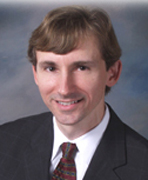
Laurens, Rhett
Rhett Laurens quizzed for Evangel Temple in Decatur, Georgia from 1975 to 1982 and was likely the best quizzer of the eight-team era, having many impressive accomplishments. Rhett’s first year at nationals was in 1976, quizzing on a team with other top 50 member Mark Gilmer and winning the national championship. Rhett returned in 1978, and his team won national finals again, this time undefeated and three wins over the second place team. In 1979, his team placed third and he was top scorer with a 109 point average. In 1981, his team placed fourth and he was fourth high scorer. His final year, 1982, his team placed second and he was second high scorer with an average of 108.57 points per game. This national finals featured the first two perfect games in the history of national finals (a perfect game being 160 at the time), accomplished first by Paul Freitag and followed closely by Rhett. Rhett placed in the top 6 four times, a feat that has only rarely been duplicated since.
Kari Brodin, said of Rhett, “I was there in ‘78 and just had my eyes opened to what ‘real’ quizzing was like, and of course Rhett was one of the ones who set that standard for me. I was able to return in 1981 and see him and his team again. Besides being a standout quizzer he was also uniquely personable and engaging. He could not only dominate a match, he could dominate the crowd with an enthusiastic, dynamic, even entertaining ability to answer difficult questions clearly and with appropriate emphatic inflection in his voice. He was not only saying the right words he was helping you understand their meaning and significance, and you were drawn in to his quizzing and encouraged by it.”
Rhett is currently a licensed attorney, earning his JD from Harvard Law School and practicing law out of the Atlanta area.
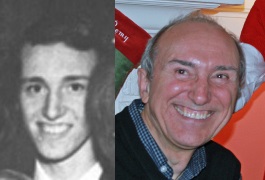
Laurens, Scott
Scott Laurens only quizzed at nationals one year, but what makes this entry unique was that it was the first year national finals was held, 1963.
Quizzing has changed a lot since those days: question styles were very different, gloves were used in conjunction with buzzers and each team was even expected to make their own buzzer set! One thing today’s quizzers will be surprised to learn is that for the first few years of quizzing, only five questions were required for a quiz-out. (This changed to six in the mid-70s and stayed that way until 2005).
Scott was captain of the first team to win national finals, from Bouldercrest A/G in Atlanta, GA. This church would change names several times over the next 50 years, and would send many teams to nationals, winning again in 1976 and 1978. Nationals that first year only consisted of three matches, played in tournament format, so it is difficult to name a top scorer, though Scott is usually credited with this honor. Scott was known as a strong team leader who could be relied on to quiz well under pressure, and he was a gracious and humble quizzing champion. Multiple other members of the Laurens family also quizzed at nationals including Scott’s brother Rusty, who was also on that first national championship team, his brother Rhett, who will be featured in a future bio, and Scott’s son Rob, who competed at national finals as both a quizzer and a coach, and who founded this website. You can read Scott’s memories of 1963 national finals here.
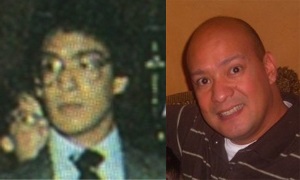
Leija, Joseph
For three consecutive years Joseph Leija led the team from First Assembly of God, New Orleans, LA to National Finals including two consecutive victories in 1983 and 1984 and a strong showing in 1985. Calm confidence would be an apt description of Joseph as he exuded this demeanor throughout his quizzing years. He was never too high nor too low and was a consistent gentleman in victory and defeat. In 1985, after winning twice in a row, New Orleans was still a strong team due to his presence and they were gracious to everyone as they passed their crown. The New Orleans teams were quite balanced as all persons could score, but Joseph was a clear leader during those years as he placed in the top 10 scorers at National Finals (2nd, 4th and 10th in 1983, 1984 and 1985, respectively). The team traveled in its own bus of sorts, and had Bible Quiz as part of their schooling, but being a champion in all facets of life was a part of Joseph’s DNA. He was and remains a servant of God, helping others with the knowledge and wisdom he gained as part of the Bible Quiz community.
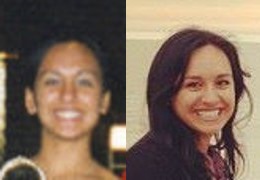
Marchalonis, Valerie
Valerie Marchalonis quizzed from 1996 to 2000 for Mountain View A/G in Las Vegas, Nevada. Her first year at nationals was in 1997. where she placed 8th individually. The next three years, not only did she improve personally, but her team improved considerably. At the 1998 finals, she was 3rd high scorer while her team placed 5th. In 1999, she was 2nd high scorer and her team tied for 4th. Finally, in 2000, she placed 3rd and led her team to a national championship.
Valerie was a very ambitious and devoted quizzer. She was always sure to delve deeply into concordance work and studied diligently to understand the meaning of the words she was memorizing. One of the deciding factors in Las Vegas’s national championship in 2000 was her total mastery of the style of the question writers. She tediously divided up the question writer’s sets to understand the patterns behind each type so that she knew where to perfectly anticipate the key word. Valerie was also a quizzer who only took reread questions when her other teammates did not know the answer and they needed the team points. This certainly lowered her individual score, but increased her team’s chance of winning.
Valerie was also one of the pioneers of taking Bible Quiz into the online world. Known by her moniker “Bible Quiz Princess”, she was very active on early versions of the forum, and was always willing to practice answering concordance questions with other quizzers over voice chats (in a day when dial-up was still the standard). Not only did she study using the internet, but she also used her access to make friends in BQ and encourage younger quizzers by helping them learn how to study scripture and improve their quiz techniques. While many teams considered what they knew to be a “team secret”, not to be shared with anyone else, Valerie found joy in sharing what she knew about studying God’s word. In matches, she was determined and ready for any challenge, anticipating interrupting points and nailing them almost every time. More importantly, Valerie left everyone around her with an upbeat excitement, regardless of how intense the competitive situation might be.
Following graduation, Valerie earned her B.A. from Biola University, and a M.A. from the University of North Texas. She currently works in the Las Vegas area.
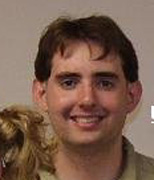
Marlow, Dan
Dan Marlow quizzed from 1995 to 2001 and while he only appeared at national finals twice, he was extremely successful both years. In 2000 he was top scorer among a very dense field of good quizzers, including several others on the top 50 list. He averaged 107.89 points per game and quizzed for Adat Yeshua Messianic Center in Overland Park, Kansas. Dan had only one other teammate that year, yet they managed to place 8th with a record of 11-8. The following year, 2001, Dan quizzed for Topeka, Kansas. That year, Dan was 2nd high scorer, averaging 105.79 points per game. His team also finished 2nd following a playoff match against Tulsa, Oklahoma. Dan also finished second in the individual competition, the final match of which may be seen here.
To those who quizzed against him, Dan was known as an extremely smart quizzer who was able to figure out concordance items to study on his own. Very few had seen him quiz before the 1999-2000 tournament season, yet he continued to earn top scorer titles at all the nations biggest tournaments. In addition, he was always willing to study with other quizzers via chat. One person who quizzed against him said, “Dan was always fun to quiz against. I don’t think we ever had a boring match against him. He was also great at encouraging other quizzers. When we quizzed him at nationals in 2000, after I answered a particularly hard 30, he called a time-out just so he could shake my hand! I’ll never forget that.”
Since graduation, Dan earned degrees in accounting and finance and serves as controller for a leading pork processor.
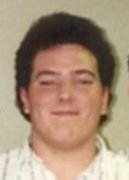
Martindale, Bryan
Bryan quizzed for Citrus Heights A/G, Citrus Heights, California and made three appearances at national finals from 1988 to 1990. He was a confident and dominant quizzer who often had an intuitive sense of when a “tricky” question was being read, which kept him from making too many mistakes. Bryan was respected by his competitors for his drive, completion skills, mastery of the material, and his ability to pull out the tough rounds. For the three years he quizzed at national finals, no team took Citrus Heights for granted. In 1988 his team finished 9th while Bryan was 4th high scorer with 77 points per game. The next year, in 1989, Citrus Heights won national finals with a 13-2 record. Brian was also 2nd high scorer, and won what was then an all day long one-on-one competition, with the final being played in front of thousands of spectators from both Bible Quiz and Teen Talent (now Fine Arts Festival) at the celebration service. Brian returned in 1990 where both he and his team placed 5th.
Although the questions in 1988 and 1990 were difficult, the 1989 questions made for particularly difficult quizzing all around, with extremely short answers and difficult-to-understand question structure. This made Bryan’s consistent accomplishment over this three-year period even more impressive. His adeptness at question completion, and his intuition about the writer’s style served him well. Most reread 30’s could be answered by anyone on any team who had a serious “in essence” knowledge of the material, and by everyone who had the material memorized. Question sets rarely had more than occasional concordance questions, which were always a short answer, except for the few found in the one-on-one competition. This resulted in lower high scores for the top quizzers who took the chance of interrupting, and often much higher scores for second and third chair quizzers who collected rereads.
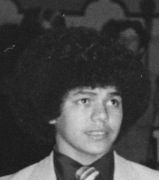
Muniz, Billy
Billy Muniz quizzed for Calvary Temple A/G in Riverside, California in the late 70s and early 80s and led his team to three straight second place finishes. In 1978, his team found themselves in a three-way playoff with Pasadena, MD and Bastrop, LA for second place an, which they won on the last question. The also finished second the next year, in 1979. The following year, 1980 they were the odds on favorite going into nationals. After the round robin, four teams were tied at 5-2 and Riverside once again ended up second after a the four-way playoff, losing to Bigelow, AR. Coach JoAnn Collins recalled, years later, that the fact that Riverside, a team of all boys, insisted on having lunch with Bigelow, a team of all girls, just before the playoff, might have had something do with the loss! The only year we know Billy’s individual placement is 1980, where he was top scorer, averaging 84.29 points per game.
Rhett Laurens, who often found himself on the other said of the table as Billy said of him, “Billy was a formidable opponent because he combined a very friendly and humble demeanor with a lethal arsenal of skills at the quizzing table; he thus took many competitors by surprise. He also was one of the most consistently strong quizzers at the national level from year to year, and led his team to 3 consecutive second-place finishes at National Finals. He was able to win many matches with his innate ability to interrupt at just the right moment, while at the same time his gentle spirit and warm personality made him one of the most-liked quizzers of the late 1970s and early 1980s. In this way, Billy Muniz represented the very best of Bible Quiz and is one of its shining stars.”
National coordinator Terry Carter once said that the Riverside was a model Bible Quiz team. They were very focused, and greatly skilled, in the match, but outside the match, they were extremely friendly and sportsmanlike. They even used to offer to pray with other teams before the match.
Today, Billy is the assistant warden at a correctional institution in California. He has commented that he has an even greater respect for Paul, who wrote many of his epistles from prison.
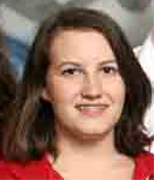
Pace, Molly
Molly pace quizzed from 2000 to 2006, and during that time amassed three national championships, more than anyone at that time but her former captain, David Dorey. This was done in 2001 as a sub, in 2004 as a consummate 10-point quizzer and third chair who went on to place 3rd in the individual competition, and finally in 2006 as 6th high scorer, first chair, and team captain.
It is clear that Molly’s skills were based on consistent and in-depth study and review. Molly’s strengths at the quiz table were poise, consistency, and strategy, which she showed time and again in her team’s 2004 and 2006 National Championships. As the captain of her 2006 championship team, Molly’s ability to make the “butterflies” in her teammate’s stomachs “all fly in the same direction” proved to be the knockout blow that won the competition in the critical 18th and 19th rounds. Even when she was feeling and quizzing a little bit out of sorts, she could inspire the confidence in her team to pull out the victory. In her team’s earlier victory in 2001 as a sub, she was the young, pixyish encourager, with the moxie to tell her much older teammates they could win, regardless of the situation.
Her ability to see time at the quiz table as an opportunity to do her best, rather than as a stomach-turning pressure cooker, allowed her to keep her negative points low and to hit questions that for her were high-probability interruptions. In a critical game at 2006 National Finals, when the team held a one game lead most of the tourney, Molly got off to an uncharacteristically bad start in a critical round against another top team, and had two wrong by question five. She was taken out of the game to pull herself together, and during the time out told her team she just needed to regroup and she would be fine. As her teammates returned to the table you could see her praying and mentally crossing her fingers at the same time. Her teammates managed to stay close to the other team but could not gain ground. At question 15 a time out was called and Molly was returned to the game with the instructions that barring a turnover they had to have four of the last five questions to win. She said “no problem” and took her position to the surprised looks of the opposing team. Molly proceeded to hit the next three questions with perfect anticipation and in a place that could only be converted to positive points by someone who had spent hours studying the writing style. She nailed the completions and answers and put the team within striking distance. She made the other team so nervous that they called a frantic time out and spent it freaking themselves out that Molly had come back so strong. In their fear of losing a critical game, they hit the 19th question so early that it would take a miracle guess to get it right. Molly took the re-read and sealed the game to the elation of her teammates. It was this type of intangible skill which the record books cannot record that made Molly the quizzer and captain she was.
Molly has seemingly always been in ministry as a Sunday School teacher and nursery leader. She has a servant’s heart and the knowledge of God’s word upon which to base her ministry. She recently graduated from college and is involved in Library Sciences and as a teacher and presenter at community educational events. She has continued to be involved in Bible Quiz as a coach and official.
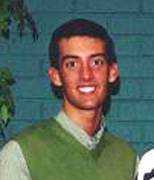
Piacenti, Kent
It’s time to forget opinions, drop personal preferences, do away with niceties, and face the cold, hard facts - Kent Piacenti, by provable, statistical record, was the greatest quizzer ever to play the game. Like him, dislike him, or fear him at the quiz table (which most did), he was a quizzing machine. He was the perfect nexus of competitive drive, natural talent, unwavering poise, and unending dedication. It was never enough to win. Kent was built to dominate and set records, and he thrived in the perfection of his craft. Watching him quiz was a thing of beauty that few will ever forget.
Kent’s first year in BQ (1996) was as a Novice Division quizzer in the suburbs of Dallas with two coaches who were also “rookies.” One year later, in 1997, quizzing in the Dallas area, he bested his achievements by being the National High Scorer and leading his team to a 5th place finish. In 1998 he not only won the national team championship and the Individual Competition, he set the record for Individual High Score (132.83), smashing the previous record by more than 17 points per game (ppg) and breaking the record for Best Quiz-Out Percentage. Finally, in his last year (1999), he moved to the Orange Hills team in California, and captained his team to either tie, or break, every team record in the history of the program, tie for the most Individual Competition wins, tie his Best Quiz-Out Forward Percentage, and smash his own Individual High Score by more than 19 points per game with an astounding average of 152.17, including 16 perfect games.
Winning everything at National Finals in 1998 was never good enough for Kent; he wanted to push himself to not only his personal best, but to smash every record. What was so amazing was that he accomplished all of that while being the perfect captain for Ricky Haney and David Dorey, who had never quizzed beyond District Finals. In 1999, Kent found success as a quizzer, and a leader, not by focusing on himself, but by constantly encouraging his team to be their very best and helping to create a team atmosphere that made winning secondary to having a great time together. He was proud to lead them through an unbelievable year of quizzing. Lest anyone forget, Kent, in leading his team at his final year of National Finals, helped break 10 team records and tie or break 13 individual records.
Since graduation from BQ, Kent has pursued degrees in music and law, being named editor-in-chief of the Law Review at University of Virginia School of Law, obtaining a clerkship with a Federal Appeals Court Judge in Portland, and accepting a position with one of the top law firms in Texas.
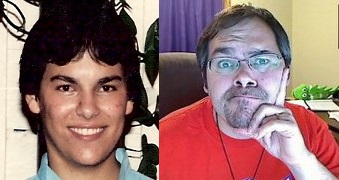
Picker, Jason
Jason Picker quizzed three times at National Finals (1985, 1987, and 1988) for the team from Eastside A/G, Tucson, Arizona. In the region, as well as across the nation, he was known as much for his poise and consistency under pressure as he was for his sportsman-like conduct and friendly, endearing manner. Make no mistake, Jason was a fierce competitor every time he took his place at the quiz table, but he also knew that the competition was to be left at the table when the game had ended, and was usually the first to approach the other team to offer his congratulations or consolations.
Jason’s first appearance at nationals was in 1985, the second and final year of the “16 teams in two separate divisions format”. Due to the odd format, it is unclear where teams placed unless they were in the top four. Jason’s team, captained at the time by his friend Lee Coate, who was 7th high scorer, finished with a 4-3 record in regular round play, which tied them somewhere in the middle of the pack with a number of other teams.
After just missing a trip to National Finals in 1986, Jason and his team returned to compete for two consecutive years in 1987-88 and amassed an impressive record. Two major changes had taken place since their 1985 showing that seemed to make all the difference in the team’s return as a powerhouse. First, Jason’s father, Ed Picker, stepped up as the head coach, bringing some much needed lessons in consistency and competitiveness. Jason had also taken over the position as captain, one which clearly suited his talents and drive. The team went on to finish 2nd after a four-way tie, just behind cross-state rival Tempe, AZ, and Jason not only jumped up to the top ten individually, but won the One-On-One competition.
In 1988, Jason came back to National Finals as a senior with a mission - a team championship. His team battled it out against an impressive field and finished 1st by a two-game margin. Jason personally was 2nd high scorer and finished 2nd in the One-On-One competition. Eastside’s team win in 1988 gave Arizona it’s third win in a row, a state record that stands to this day.
Jason lives with his family in Idaho and works for Microsoft. He remembers his years in Bible Quiz as an ongoing positive influence in his daily life.
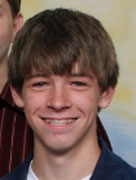
Porter, Blake
Blake Porter quizzed for James River Assembly in Ozark, MO from 2004-2009, and made five straight Nationals appearances with four 3rd-place team finishes. This remarkable run included three top-10 individual scoring finishes. In 2008, he won the Individual Tournament.
Blake was an extremely driven quizzer, often challenging his teammates to be better and pushing himself to do his best. At every tournament, Blake’s teams were consistently among the top finishers. From 2005 to 2008, Blake’s team won 4 consecutive Gulf Regional titles, and Blake was high scorer twice in that span.
In his 2008 Individual Tournament win, he had to mount a fierce comeback in the final few questions to earn the victory. In each of his teams’ four 3rd place finishes, they were in striking distance of winning the title. Quizzing at that level often comes down to one or two questions, leaving one to wonder what could have been. Through it all, Blake was his consistent, fiery self, driven to do his very best to win every possible game.
Blake’s fierce determination and notable consistency earn him a spot among the all-time greats. Today, Blake is studying accounting at Evangel.
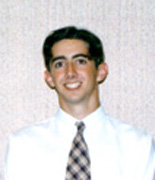
Reed, Matt
Matt Reed quizzed for St. Clair Shores, MI in the mid-1990s. In 1994, this team burst unexpectedly onto the Nationals stage, capturing the title seemingly out of the blue. Matt was a junior this season, and finished 4th in individual scoring.
In 1995, St. Clair Shores returned to Nationals with all three starters from their championship team. Though they weren’t able to replicate their success from the previous season, they did defeat Santa Ana, CA in a playoff to capture third place. Matt Reed once again finished in the top 10 scorers, ending in 6th place. That same year, Matt was the Individual Tournament champion.
Though his Nationals career was brief, his results were meteoric, proving himself against some of the other great quizzers that occupy spots on this list. He was a lethal hitter and a smart competitor.
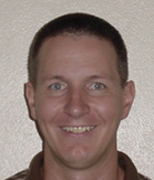
Revell, Kevin
Kevin Revell was the third member of the famed Lakeland, FL team of the early 90s. The oldest of the boys, Kevin’s senior campaign ended in 1990 with their first title over James and Romans.
1988 marked Kevin’s first trip to Nationals. His team finished in 8th place, and was one of two teams from Carpenter’s Home Church that qualified for Nationals. This was a first for any church, as the 16-team expansion only happened in 1984.
In 1989, Kevin would make a giant leap forward, leading his team to 4th place. Kevin was the overall top scorer this season. His excellence that year set the stage for his senior year.
The 1990 National Finals brought together the brash group of boys from Lakeland, FL. Kevin was joined by fellow 50 Greatest Quizzers Garrett Smiley and Joshua Weber. The critical game came in round 9, when Lakeland beat 2nd place finisher Park Crest A/G from Springfield, MO 200-110. This allowed them to withstand losses to Moberly, MO and Houston, TX and end with a 13-2 record and the first of two consecutive titles. Garrett Smiley led the team in scoring in 1990, but Kevin added an Individual Tournament title to his impressive resumé.
Today, Kevin resides in Kentucky and works at Murray State University. He completed his PhD in Chemistry from the University of South Florida in 2006.
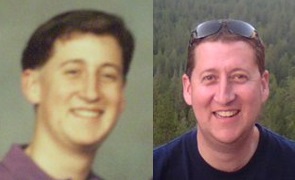
Rodriguez, Jeremy
Jeremy Rodriguez quizzed from 1988 to 1993 at Life Center in Lakewood, CA, making two very unexpected yet successful trips to National Finals, and his performance as a second-chair quizzer in 1993 was integral to the success of his team’s National Championship. He is one of only a small handful of 2nd chair quizzers to be honored in this Top 50 project due to his memorable performances.
His route to a championship was unexpected because Jeremy started in the autumn of 1991 in the B-League. The NYM had changed the eligibility rules to be solely by age, which meant that a number of top quizzers across the country had another year of eligibility. However, in February of 1992 the NYM was forced to repeal the eligibility ruling retroactively to the beginning of the quiz year. Reeling from the loss of one of their top quizzers, Jeremy was pulled up quickly from the B-League to fill the void. All of a sudden he was forced, half way through the year, into extra memorization, concordance work, trips, tough competition, and a role on a team he had never expected.
Jeremy’s team, now seeing a chance at the 1992 championship as less of a possibility, made a concerted effort at the 1992 finals to do their best and use it to build toward a serious chance in 1993. The Lakewood team improved over the months leading up to 1992 National Finals and finished in a three-way tie for 4th place. Jeremy’s teammate, Dan Smith, won the 1992 One-on-One, and the team looked prepped to hit the ground running for the 1993 championship, which they did. From tournament to tournament during the 1992-93 season, Jeremy’s name moved closer and closer to the lists of high scorers. More impressive was that while the team’s captain, Dan Smith, was consistently scoring among the top five at each competition, Jeremy was second-chairing his team to one tournament victory after another. By the end of the tournament season, Lakewood had won ten tournaments and lost none, and Jeremy would often find himself hovering just below 10th place. However, it was at National Finals that Jeremy pushed himself to new heights. In three rounds he won the game by hitting and correctly answering the last, or last two, questions. When Dan had a bad game, Jeremy would turn it on and step up as the high scorer, going after questions Dan normally took, and showing a level of competiveness rarely seen at nationals. At the end of National Finals, Jeremy’s team had won the championship with a record of 18-1, their only loss coming on the last question of the game when he and Dan were already on the bench. At the time it was the greatest record since expansion. Jeremy also finished 8th high scorer behind his teammate in 2nd place. And in the One-on-One competition, Jeremy took out three quizzers who are on this “Top 50” list, finally finishing 3rd in a hard-fought semi-final.
His captain said of him: “Jeremy won Nationals for us. He was amazing and came through for the team when we really needed him.” To top it off, the National Finals officials independently created a special award for Jeremy that was presented at the awards ceremony. They said his performance was the greatest “clutch quizzing” they had ever seen at Nationals. In one of the rounds, with his captain quizzed-out backwards, Jeremy anticipated perfectly and answered the last five questions to win the game in a year that everyone said the questions were the toughest they had ever seen. The opposing coach came up to him after the round and said in his familiar southern accent: “That’s the most amazing quizzing I have ever seen. You were anointed by God to win.”
Since graduation, Jeremy completed his B.A. from California State University, and is active in both his church and various local charities. He regularly quizmasters in Southern California and has trained his parents to become BQ coaches.
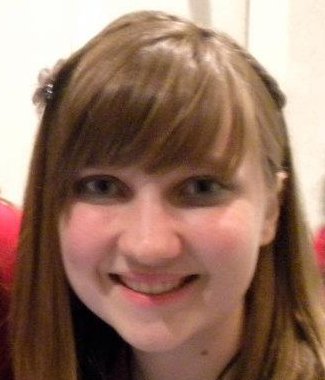
Rogers, Abby
Abby Rogers is one of a very small number of current quizzers to make the list, and in looking at her brief but impressive resume’, it’s not difficult to see why. As a sixth-grade student in 2009, Abby stormed onto the Bible Quiz stage, finishing as the 3rd high scorer at Nationals. In that same year, she was also still participating in JBQ, where she finished as the high scorer at those Nationals.
2010 was, quite simply, the year of Abby Rogers. Her team, Victorious Life Church from Wesley Chapel, FL won the National Championship. Abby won the scoring title, the Individual Tournament, and the Quoting Bee. She is the only quizzer in history to pull off that hat trick. This was the first year that the Final Four format was used to crown a champion, and in the final game, Abby’s team upset the Owasso, OK team to capture the title.
Abby followed up her unprecedented 2010 with another scoring title in 2011. She led her team back to the Final Four and a 3rd-place finish. She again took the Quoting Bee crown after an exciting duel during the banquet.
Abby has four more years of quizzing ahead of her, and already she has become one of the greatest quizzers of all time. Today, she is a Freshman in High School and is continuing to dazzle Bible Quiz audiences everywhere she goes.
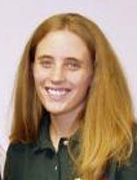
Schneider, Jordan
Jordan Schneider quizzed from 1995 to 2001 in Colorado Springs, CO, first at Radiant Church then at the Church at Briargate (a church-plant of Radiant), quizzing all six years at national finals. In 1996, she placed 20th with an average of 55 points per game, getting a rare perfect game at nationals as a 7th grader. In 1997, she placed 15th with 60.87 points per game. She then placed top 6 the next four years: 4th in 1998 (83.04), 6th in 1999 (73.48), 3rd in 2000 (98.42) and 5th in 2001 (85.26). She also won the individual competition in 2000 and the Curtis Scholarship in 2001. From 1999 to 2001, her team also posted high finishes, earning 5th in 1999, 2nd in 2000 and winning national finals in 2001. Jordan also is the daughter of Jodi Heugel, top scorer and championship team member from 1977.
Throughout her career, and especially in 2000 and 2001, Jordan was a formidable opponent to any team she played against. She was especially skilled at very extensive concordance work, both due both to experience and having a network of very bright former quizzers at her disposal. She was a very clean, and very fast quoter. The final round of the 2000 Individual Tournament, which she won, featured one especially hard 30, asking for all Old Testament Scriptures in Galatians. She gave a flawless answer in 20 seconds, causing the quizmaster to remark, “It was only 10 answers, not 25!”
The following year featured one of the most exciting matches at national finals ever. Following round 17, Briargate was in first place with three losses. Four teams, Topeka, Tulsa, Lebanon and King’s Chapel from Springfield, MO were tied with four losses and Briargate had to face King’s Chapel. The rest of the story, we leave to King’s Chapel’s captain, Richard Fair:
I was there. I really was. It is the only time, and probably the last time I will ever see a single question last at least 30 minutes due to contesting (without any appeals to the coordinator). Here’s what was tricky. Briargate was up by 5 points with 2 questions left 19 for 20 points and 20 for 10 points. Number 19 was a Scripture Text Question, Give A Complete Answer From 2 consecutive verses. From Luke Chapter 6. Jordan had 5 right, so even if we got 19, she could get 20 for the quiz-out and win.
Question 19. What happened when Jesus, quote, “stood on a level place?”
I interrupted on Jesus and got it wrong. We then knew that it was over. The reread went to Jordan and she got it right. We confer. However, we contest on Jordan’s answer. Here is Luke 6:17 and 18:
He went down with them and stood on a level place. A large crowd of his disciples was there and a great number of people from all over Judea, from Jerusalem, and from the coast of Tyre and Sidon who had come to hear him and to be healed of their diseases. Those troubled by evil spirits were cured,
In verse 18, Jordan said the word sicknesses rather than diseases. We contest incorrect information due to Luke 7:21:
At that very time Jesus cured many who had diseases, sicknesses and evil spirits, and gave sight to many who were blind.
It was a brilliant idea to contest; I’d like to say I thought of it, but Eric Hernando did. Our premise was that since:
A: Luke 7:21 lists three different things–especially differentiating between diseases and sicknesses.
B: Luke 6:18 only mentions diseases and not both or just sicknesses
C: sicknesses is incorrect information.
Initial vote was cast and split. Doug Black, Lorna Albanese, and George Edgerly discussed and discussed and discussed and discussed the issue. Meanwhile, other teams are looking into our room to see what’s happening.
We won the contest. Jordan then was counted wrong, given 30 seconds to confer and contests. I can’t remember if that contest was a split vote or not, but it took a while on this question. Some team parents were filming this match and the camera went dead after this question.
It is kind of ironic, though, that the match was won on 20 and not 19. When I missed the question, that should’ve been it. Jordan then hits on Luke 2:fo(u)r… and pulls it out. Here were the possibilities for a 10 point analysis question:
2:4 several individuals and geographical locations
2:14 Glory to God in the highest…no analysis
2:41 Jerusalem
2:43 Jerusalem or Jesus
2:45 Jerusalem
No other analysis in the 40s
Obviously 43 would be a bad verse, Jordan decided to pick 41 and was right. I asked her later how she knew 41, and she said that she remembered 45 being asked earlier in the year, so she went for 41. I didn’t even remember what I ate for breakfast that day let alone questions asked 6 months earlier. But, I guess it’s little things like that that help win Nationals. She quizzed out by the way, and Briargate had sealed up a well-deserved national title.
Following graduation, Jordan continued to be involved with Bible Quiz for many years, including coaching the 2004 national champions from Briargate. She recently graduated from medical school and is currently an OB/GYN resident at the University of Colorado. She and her husband Ben are currently expecting their first child.
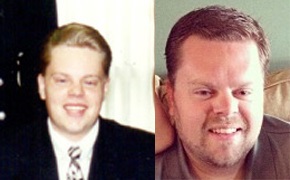
Slater, Dan
Daniel Slater quizzed in Michigan, qualifying for Nationals three times, 1994-96. His first National Finals, 1994, as a sophomore, was his most successful. He was part of the St. Clair Shores team that seemed to come out of nowhere to win the title, upsetting several more established Nationals contenders. Daniel finished 9th in scoring, his first of three top-twelve finishes.
In 1995, St. Clair Shores nearly repeated their success, finishing 3rd and proving that their 1994 run was no fluke. The talented Michigan team could quiz. Daniel finished 12th in scoring from the balanced team.
1996 was a different year for Daniel. His family moved to Beulah, MI in his senior year, and Daniel was left with the daunting task of trying to lead a fresh team to Nationals success in his final year. At Nationals, Beulah led the way for several rounds, succumbing to some tough losses in the last day and winding up 5th, an impressive result for the savvy veteran. More notably, Daniel was the overall top individual scorer, the only quizzer to average over 100 points per game, and besting his closest rival by more than 300 points.
Daniel Slater was a focused, skilled competitor and a first-rate hitter. He handled long quotations and difficult concordance well, and demonstrated great success at Nationals as an individual and as part of a great team.
Today, Daniel lives with his wife and three children in Tennessee, and serves on the faculty at Union University.
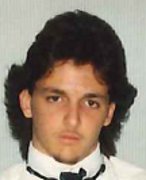
Smiley, Garrett
Garrett Smiley quizzed for Carpenter’s Home Church in Lakeland, Florida from 1988 to 1991, and quizzed at three national finals. Garrett’s first year at nationals was in 1988 when his church was the first to send two teams to national finals, which could not have happened before the expansion to 16 teams in 1984. He finished 25th and his team placed 8th. Garrett returned to national finals in 1990 and 1991, together with hall-of-famer Joshua Weber, and led his team to back-to-back national championships. These back-to-back wins tied his team, at the time, with only three other churches who had accomplished this feat. Garrett placed 4th individually both of these years, averaging 71.67 and 89.00 points per game, respectively. His last year he also led the quiz-out forward race with 11 quiz-outs in 15 rounds, a record at that time. He was a take-charge quizzer who deftly helped his team to pull out difficult wins even after games had begun badly. This steely focus allowed them put together consecutive championships at a time when question completion was the most difficult part of the game.
In addition to his quizzing, Garrett was known by everyone to be a flashy and dramatic contestant who had a dominant presence the game. For probably the first time in the history of BQ, there was a top national quizzer who seemed to take his competitive stance more from successful sports figures than the usually timid attitude of most quizzers. He prepared for the competition by pumping himself up, and while conferring he never looked in the scripture portion or rule book, but spoke quite loudly for everyone to hear his thoughts. He certainly had his own special, and often funny, way of doing things; to the delight of other quizzers and stern looks from judges. Many who knew him said he was a “character”, and that he brought a more jovial mood to the competition, which some thought was a needed boost to lighten up what were often long and tedious rounds.
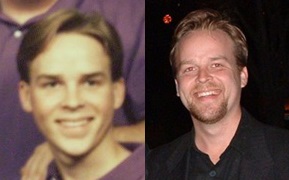
Smith, Dan
“Dan the Man.” It was a moniker given by his teammates when they saw how quickly he took to the varied elements of quizzing, and one oft repeated by his friends and competitors for his consistently amazing Bible Quiz performances. What most did not know was that Dan was “the man”, but not for the reasons outlined above. Dan, as a freshman in 1989, came to Bible Quiz for one reason alone - he had an insatiable desire to know, understand, and apply scripture to his everyday life. What made Dan a great young man of God was this yearning for true knowledge. What made Dan a great quizzer was the fact he understood that mastering the game, which required mastering the material, would provide the drive to reach his ultimate goal - being “a workman that needeth not to be ashamed, rightly dividing the word of truth.” Dan was lighthearted and easygoing, even in the most tense situations. He also endeared himself to his teammates by always putting team unity and performance way above individual achievements.
He began as a freshman studying the books of Romans & James and was on fire. However, while Dan’s flame grew bright, his teammates study slowly diminished. He did well at district finals, but found that was not enough to get him past regional finals. Just before the beginning of Acts, Dan found he had no teammates at his church and a coach who was retiring, so he was allowed to quiz with the next closest team to his church. He joined his new team with excitement and eagerly learned new strategies and better ways to hit, complete, and answer questions. At National Finals in 1991, Dan came on strong and was in the top ten quizzers the night before the final day of quizzing, just ahead of his team captain. Unfortunately, a family tragedy occurred that devastated him. His mother convinced him that he should stay and finish nationals, but after a night without sleep, he lost his momentum and dropped to 15th. On the final day the team lost three of their last five games and finished the round-robin play in a tie for 2nd place, which they won. Dan blamed himself, but his team reminded him that it was a team effort, and that 2nd place was certainly something of which to be very proud.
In the 1991-92 season, a ruling by the national office had allowed some former quizzers, including the team’s top quizzer in 1991, to continue quizzing; then in the middle of the season the decision was reversed, setting the Lakewood team back and forcing them to bring up the top quizzer from the 2nd team, a relative newcomer (Jeremy Rodriguez). The team went from thinking they had a serious shot at a championship to doing their best and using the year to grow into a team that could vie confidently for the 1993 title. Dan was undaunted, and at the 1992 finals the team tied for 5th and Dan finished in the top ten. Throughout the year Dan had been undefeated in One-On-One play at tournaments. He started off the National One-On-One competition by losing the first round. A bit rattled, he quickly regrouped and proceeded to win the entire sudden-death bracket, then beat the quizzer who had beaten him in round 1. To win the championship Dan now had to win two games in a row in front of the Bible Quiz banquet audience. He handily beat his competitor both times to claim the title.
The 1992-93 season over Luke really began for Dan right after 1992 Nationals on the long drive home from Fort Worth, TX. He first wanted a Luke portion to study on the way home. Then, while traveling through Arizona, Dan moved up behind his coach and quietly asked: “What do I have to do to win nationals?” The answer: “Agree to do whatever I tell you to do when I tell you to do it.” He was told to think on it before responding. Five minutes later he agreed, saying: “I’ll do it, and if it looks like I am slacking off, just remind me that I made this promise.” Fortunately, the conversation was rarely revisited.
During the 1992-1993 season, the team won all ten tournaments they attended, and Dan won every One-On-One competition he entered, which were quite common in those days. Sailing through Regionals, the team spent 40-50 hours per week in practice for six weeks in the Summer, knowing their top two competitors (Bartlesville and Braeswood) would do the same. Dan’s work, along with his teammates, paid off big. The team finished 1st with a record of 18-1, the best record since expansion. Dan finished 2nd High Scorer, while his teammate Jeremy Rodriguez finished 8th. Dan proceeded to win the One-On-One Competition from start to finish, with Jeremy finishing 3rd. The team was triumphant and no one was happier than Dan.
Back then Nationals was held in conjunction with General Council, and big BQ events were reported in the daily General Council newspaper. A reporter contacted Rich Percifield, then BQ National Coordinator, and said getting through an interview with Dan about winning the One-On-One was almost impossible because all they wanted to talk about was the fact that his team won the championship. He told the reporter what he had always happily announced to anyone who would listen: “I LOVE this team.” To this day he rarely discusses his personal accomplishments, preferring to elevate his teammates over himself.
Since graduating college Dan has never stopped studying God’s word, and can still perfectly quote huge portions of what he learned in BQ. Dan worked with a conservative think-tank in Washington, D.C., made a career in real estate, and is now a regional manager for a major energy company. He is happily married to the love of his life, Sheryl, and has five children. He has consistently served as a QM at all levels of BQ since 1993, and is an elder and teacher at his church.
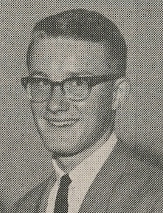
Sorenson, Steve
Steve quizzed for Calvary Full Gospel A/G, Inglewood, California in an era that hardly resembles the quizzing of today. Quizzers wore mittens on their hands and raised them when they wanted to answer, along with the use of a quiz board, which was a long plank of wood with lights that were supposed to help officials whose job was to do nothing more than watch which hand went up first, since the “boards” were not always accurate. Questions styles were drastically different, and completing an interrupted question was often much more difficult than giving the answer. Consider the fact that teams would show up for a three game national sudden-death final after having heard fewer than 20 sets ever from the official writer over a book the size of Mark. Not to mention that the final championship round was played in front of thousands of spectators at General Council. To get an idea of what it might have been like, follow this link.
1965 was the last year that national finals consisted of a tournament with only three rounds, and Steve led his team to the national championship. As with Scott Laurens in 1963, traditionally, he has been considered the top scorer from 1965 as captain and high scorer of his team. In the final championship round, Steve led all scorers with 120 points. Steve’s team began a three-year championship streak for the Southwest Region, which would eventually claim 18 championships, besting the next closest region by 11 wins, as of 2011.
After graduation, Steve continued to be involved in Southern California Bible Quiz for many years, serving as an official and district coordinator. He also wrote the official questions in 1978 over I & II Corinthians.
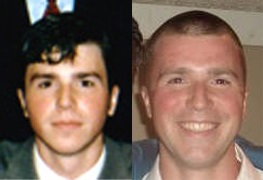
Trout, Daryn
Daryn Trout quizzed for Allison Park, PA in the 1990s, and he holds a few important distinctions. Daryn is one of two of the first quizzers in history to compete at National Finals for six consecutive years. He (along with Rochelle Cathcart from Park Crest A/G in Springfield, MO) made his first trip to Nationals in 1990 as a 7th grader. This was unusual, because in those days, Nationals teams generally reserved their roster spots for older, more experienced quizzers. With only 16 teams competing out of more than 1200 nationwide, qualifying for Nationals was extremely difficult and usually required significant experience. So a 7th grade quizzer was highly unusual.
Even more unusual was the fact that Allison Park was making only their second of what would become fourteen consecutive Nationals appearances. This record-setting performance was due to the leadership of coach John Porter and his well-seasoned quizzer, Daryn.
In his first three Nationals (1990, 1991 and 1992), Daryn was learning the ropes and laying the groundwork for future success. In 1993, the team finished 7th and Daryn was the 14th high scorer over the very challenging Gospel of Luke.
1994 was a year of joy and heartbreak for the Allison Park team. They finished very well at every tournament they attended, and were one of the favorites at Nationals. Some disappointing games left them in 7th place, and Daryn, who tied for 15th in scoring, was hungry for more.
Heading into the 1995 season, there were many unknowns. NIV was introduced, creating a lot of issues for veteran quizzers who were familiar with the more lyrical KJV. The questions were difficult to read for key words, and there were a number of competitive teams. But Daryn was determined to make his mark in his senior year. At the end of 19 games, Allison Park finished with a 16-3 record, tied for 1st place with their Northeast rival, Syracuse, NY. This was the first tie for the championship in the expansion era, and it brought the first championship playoff. In the end, Daryn led his experienced team to victory, and the National title Allison Park had sought was finally in their grasp. Daryn also secured his first top-10 scoring placement, tying for 10th.
Daryn’s comparatively low individual finishes may raise questions, but they shouldn’t. Allison Park was long known as an extremely balanced team, and the hallmark of their team was competitive balance. It’s what made them such an effective team. Even if one quizzer struggled, another would be able to step in and fill the gap, making them lethal to face in every game. When asked about Daryn, coach John Porter said, “He was probably one of my top 3 quizzers of all time. He was a leader by example, with incredible accuracy and interruption skills. He always had a great attitude and certainly led the team when we won Nationals.”
Today, Daryn lives in Maryland and is a distinguished police officer.
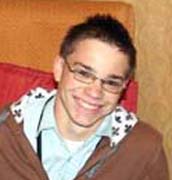
Wagner, Daniel
Very few current quizzers have made this list, but it certainly would be incomplete without the inclusion of Daniel Wagner. Daniel has quizzed since 2006 with Owasso First A/G in Owasso, OK, and has one of the most impressive list of achievements of any quizzer in the past 50 years, not to mention one of the most determined faces ever to sit at the quiz table. If you officiate a game for his team, there is no question in your mind that Daniel is there not only to play, but to win. This should not be shocking to anyone who knows how much work he puts into his preparation for competition. A great attribute of Daniel’s is his ability to be all business at the quiz table, and immediately after the game to shake hands and make friends. He is ferociousness in game play is pleasantly balanced by his friendly nature and infectious smile.
Owasso’s first year at National Finals, 2007, they placed 16th in the championship division. Little did anyone know that the following year they would become one of the most dominant teams in Bible Quiz history. In 2008, they became only the second church since expansion to go undefeated at national finals. That year, Daniel placed 20th, behind his two brothers who placed 5th and 7th, which is the third highest three man finish in history. In 2009, Owasso won national finals again, with only one loss, and Daniel placed 11th. In 2010, the Final Four tournament format was introduced at national finals and Owasso ended up 2nd following the final match, having gone 17 - 2 in the regular rounds. Daniel placed 4th individually that year, with his brother Jesse right behind him as 5th highest scorer, an impressive feat in any year. In 2011, Owasso won the final four, having gone 17-2 again in the regular rounds, while Daniel placed 3rd. This last victory ties Owasso with two other teams, Orange Hills, CA and Decatur, GA, who have won the national championship three times, and only one victory behind Church at Briargate with four championships. Not to mention that he still has two more years of quizzing. Over the last four years, Owasso amassed a cumulative win-loss record of 71 - 5 at national finals, and their three championships and one 2nd place finish make them the most dominant team in any four-year period. Daniel has also excelled in other competitions at national finals, winning the individual tournament in 2009 and 2011, placing him in a tie with two other quizzers, Kent Piacenti and Dan Smith, for most individual competition wins ever. His team’s three national championships doubled the previous three championships won by teams from the South Central Region.
What many may not know is that Daniel is one of the brightest examples of putting God’s word into godly deeds. His father is a world-renowned Evangelist, and Daniel has not only spoken at crusades to crowds of thousands under his father’s direction, but has headed up and been the main speaker to youth conventions in various non-Christian countries around the world. These crusades are often attended by more than 10,000 teens, many of whom come to know Christ through the words God speaks through him. Daniel’s wealth of scriptural knowledge has been the perfect preparation for ministry. He says he has been called by God to a lifetime of evangelistic work, and he has eagerly answered that call, excitedly jumping into ministry as a teenage Missionary/Evangelist. His current plans are to attend Oral Roberts University after high school to earn his bachelor’s degree, followed by full-time ministry.
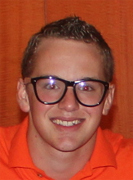
Wagner, Jesse
Jesse Wagner quizzed from 2006 to 2011 for Owasso First A/G in Owasso, OK. At his first National Finals, in 2007 Jesse placed 26th, but followed this with three top ten finishes for individual score in the next four years (2008, 2009, 2010 and 2011) and three National Championships with his brothers. Jesse has never been the high scorer on his team, but his consistently amazing performance as third and second chair has made Owasso’s outstanding accomplishments possible, and he is one of only a small handful of second chair quizzers to make the Top 50, which is quite an impressive feat. Jesse may often seem less intense at the quiz table than either Josh or Daniel, but don’t let his easy going manner fool you, his commitment to God and studying his word have been proven time and again in his team and individual placement.
Owasso’s first year at national finals, 2007, they placed 16th in the championship division, yet the following year they would leap forward to a dominating, undefeated championship and begin a four-year run that would leave them as one of the most dominant teams of the first 50 years of BQ. In 2008, Owasso won again, and Jesse finished 7th behind his brother Josh’s 5th place finish. In 2009 their team won again, becoming only the 7th team to win two championships, and Jesse placed 18th behind his brother Josh in 7th and his brother Daniel in 11th, one of the greatest three-man finishes in history. In 2010, Owasso finished the round-robin in first, but finished 2nd place overall after a new playoff format was introduced, with Jesse finishing 5th behind his brother Daniel in 4th. Finally, in his last year of competition, 2011, Owasso won Nationals for the third time, becoming only the 5th team to win Nationals three or more times, while Jesse finished 4th behind his brother Daniel in 3rd, tying the best 1-2 finish by two people on a team since expansion in 1984, which was accomplished by a brother-sister duo from Bartlesville, OK in 1992. Further, Jesse became one of only two other quizzers to ever win Nationals three times. In his five years at National Finals, Jesse quizzed out 62 times as a second chair quizzer, which is an amazing feat. His team’s three national championships also doubled the previous three championships won by teams from the South Central Region.
What some may not be aware of is that Jesse has already been involved in ministry for a number of years as both an Evangelist and a Musician. He has definitely taken the knowledge gained from Bible Quiz and allowed the Holy Spirit to help him turn it into applicable wisdom. Jesse has not only led worship in various ministries in the U.S., but across the world. Under his father’s direction, Jesse has preached to thousands, and has gone forth and headed up youth conventions in heavily non-Christian countries, administrating and speaking to crowds in excess of 10,000. Jesse knows he has been called by God to a life of ministry through speaking and music, and has clearly developed his God-given talent in both areas.
His future plans include finishing his college degree and moving forward in the ministries God sets before him. Regardless of where he goes to minister, he knows the Spirit will encourage and sustain him by the words he has committed to his mind and his heart.
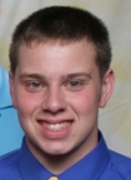
Wagner, Joshua
Josh quizzed at National Finals from in 2007, 2008 and 2009 in the early years of what would become one of the best teams in the history of Bible Quiz. Along with his two brothers, Jesse and Daniel, his team became only the fourth since the 1984 expansion to win an undefeated national title. What many may not know is that the Wagner family are Canadian citizens, which also made the 2008 championship the first by legal aliens.
Josh was, in fact, the person who introduced Bible Quiz to his family. While they were attending a non-AG church, Josh made friends with some teens from Owasso First Assembly who told him about quizzing. Although his brothers seemed a little skeptical at first, they slowly warmed to the idea and their family started attending Owasso First Assembly where the boys joined the quiz team.
Their first appearance at Nationals Finals was a great learning experience, and they as finished 16th while Josh was the 5th high scorer, winning the quoting bee. However, the team returned home with a goal of becoming one of the greatest teams ever. That may have seemed lofty at the time, but just as Owasso decided to kick their studying into high gear, a new writer came along whose style leveled the playing field. Aaron Kohler’s questions were some of the easiest to interrupt, yet had some of the most lengthy cross-referenced answers ever asked. The only advantage any team could gain was to memorize every reasonable concordance and chapter analysis item, and Owasso did just that.
Josh and his team returned to National Finals in 2008 as a team on fire. They ended with a perfect 19 wins and 0 losses. Josh, their high scorer, again placed 5th individually - a move all the more impressive when you consider that his teammates finished 7th and 20th. He also repeated his quoting bee win. Not since 1999 had a team learned the material at such a high level, and that overwhelming knowledge advantage made Owasso seem like they were quizzing at light-speed while most everyone else was nearly standing still. With Josh as captain, the team put on a spectacular two-year performance that set the standard for everyone else.
When Owasso returned to the 2009 finals, they were the odds-on favorite to win back to back titles, and win they did. Their final win-loss record of 18 and 1 secured another team victory in stunning fashion, and Josh again led the team as 7th high scorer, with his brothers close behind at 11th & 18th place. Having such a strong team certainly diminished his individual placement since he would let his teammates have first chance at most re-read questions. However, as with so many other great captains of championship teams, he considered team accomplishments to be the ultimate goal, with individual awards being icing on the cake.
Throughout high school, Josh’s in-depth knowledge of scripture was a constant source of strength and confidence as he partnered with the Holy Spirit and spoke to groups of thousands at various Christian rallies and conferences around the world, often in nations that are openly hostile to Christianity. To complete his education before entering full-time ministry as an evangelist, Josh currently attends Oral Roberts University on a full-ride scholarship. He was recently married and lives happily with his new family in the Tulsa, OK area.
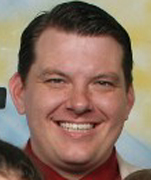
Weber, Joshua
Joshua Weber was part of the famous Lakeland, FL teams of the early 1990s. In 1990 and 1991, Lakeland won back-to-back National Championships over James & Romans and Acts. Joshua was a starter on both of those teams. In 1991, he was the runner-up in the Individual Tournament. In 1992, he was back at Nationals, winning the scoring title. These years were among the most competitive in Bible Quiz history, and some of the most legendary quizzers competed in that era. Joshua proved his mettle by pulling off an outstanding three-year run against some of the most difficult teams ever assembled.
The Lakeland team was known for its brash style and competitive spirit. Teammates Garrett Smiley and Kevin Revell joined with Joshua to form the nucleus of an intimidating group of quizzers. In 1991, after Kevin graduated, Joshua and Garrett once again took Nationals by storm, finishing with a two-game lead over the second place team. Joshua was the 8th high scorer that season. In 1992, although his team slipped to 10th place, Joshua averaged 90 points per game to lead all scorers over Galatians, Ephesians, Philippians, Colossians, and Philemon.
Over Joshua’s three National Finals appearances, he won two Championships and a scoring title. He takes his place among the greatest quizzers because of his talent, skill, style, and diligence. Today, Joshua lives in the Tampa, FL area with his wife and children where he coaches Bible Quiz. In 2010, his team won the National Championship.
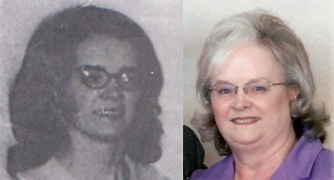
Whorton, Linda
Linda Whorton quizzed for Centreville A/G in Centreville, Virginia in the early 1970s. She is the first person to win back-to-back scoring titles since top scorers were announced starting in 1968. Northern Virginia quizzing was very strong in these days, with Centreville, then Ebony sending teams every year from 1968 to 1973. Linda’s first year as top scorer was in 1970. Her team’s placement is unknown. In 1971, Linda repeated as top scorer and her team was second, fighting it out with New Orleans in a playoff match. Linda was kind enough to provide us with scoresheets for all of these matches and it is easy to see that she was a phenomenal quizzer, posting scores well over 100 nearly every match. George Edgerly describes Centreville as the “first great interrupting team and among the first to deliberately interrupt”. Linda’s memory is still sharp as a tack. When asked if she still remembered details of her years as a quizzer, Linda replied “Your question made me laugh. There is NO way I could ever forget the games the year we had the playoff for the book of Matthew…sometimes I wish I could forget!”
Linda Whorton Winstead currently works at the Potomac district office and speaks fondly of the effect that Bible Quiz had on her life.
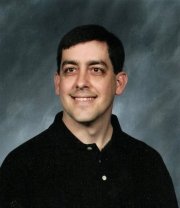
Wootton, Bryan
Bryan Wootton quizzed from 1987 to 1993 for First A/G, Bartlesville, OK. His first year, in 1988, he placed 18th and average 39.67 points per game and his team finished 7th. In 1990, his team finished 6th. We have limited individual data from that year and do not know how he finished. In 1991 he placed 21st and average 51.33 points per game and his team finished 6th. In 1992, he finished third, with an unknown average (just above his sister, and hall-of-famer, Lisa) and his team placed third. In 1993, he placed 6th with an average of 72.11 and his team placed 2nd, with an impressive 17-2 record. In fact, his team was the only team to beat the national champions from Lakewood that year.
Bryan is a great example of the perfect team player. His skill set was designed to specifically complement the talented quizzers around him (whom he was also related to). Bryan was a very quick hitter, and often he set the pace in games. He was less concerned with his average points per game, and far more concerned with making certain his team won. The Woottons are, by and large, a competitive family, and Bryan made Bartlesville a contender. He also overcame some issues with stuttering, proving that such difficulties do not have to hold a quizzer back from being among the best. Anyone who quizzed against Bartlesville knew that they had to contend with Bryan if they wanted to win.
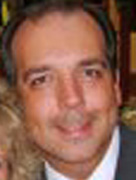
Wootton, John
John Wootton quizzed in 1983 and 1984 for Byesville, OH. The last two of those years, his team competed at national finals. In both years they faced off against First A/G, New Orleans, LA in playoffs, coming in second each time.
The format of nationals in 1984 included a Final Four, although it was a different version than what we currently have. Eight teams competed in two flights and the top two from each advanced to the Final Four, where a four-team round robin was played. John was top scorer at both of these national finals, becoming only the third person, and the first male quizzer, to achieve this feat. John’s average score in 1983 was 113.57 points per game and is believed to be a record at that time. John’s average would not be broken until 1994, by Lisa Wootton (no relation).
In his prime, John was known for being a quizzer who was very steady in big matches; he shouldered the responsibility for carrying his team and he was under constant pressure to perform well in every quiz. He was fast on the buzzer, knew the material inside and out, and despite being a top-notch quizzer was a very humble young man. John graduated from Evangel University in 1988 (writing official questions that year as well) and currently serves as A/G district superintendent of Ohio.
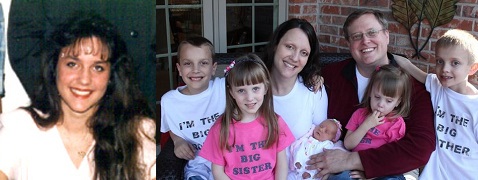
Wootton, Lisa
For the Woottons, quizzing was a family thing. It began with Lisa’s parents, Sue and Harold, who served as coaches and built a top-flight program that qualified for Nationals all but one year from 1987 to 1995. Bartlesville finished in the top six teams at Nationals in each of Lisa’s five appearances.
Individually, Lisa was one of the top scorers in history. She was 5th in 1991, 4th in 1992, and 1st in 1993 and 1994. Lisa was a fiery competitor who worked extraordinarily hard and was devoted to her studies. In addition to her outstanding Nationals finishes, she was among the top scorers at every tournament she attended and was considered by many to be the single-greatest quizzer of her time.
Today, Lisa Wootton Ramsey lives in Springfield, MO with her family where her husband is a doctor.
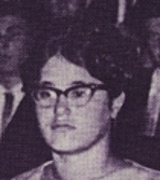
Workman, Sharon
Sharon Workman quizzed for Full Gospel Chapel in Denver, Colorado in 1966 and 1967. Most of the details of these years have been lost to history. We do know that they were the first two years in which national finals was played as an eight-team round robin, as opposed to a single-elimination tournament. Top scorers were not announced until 1968, so by convention she is listed as the top scorer these years because she was captain of the championship team. In these days, teams had very little information about the other teams before arriving at nationals. Invitational tournaments were still years away. George Edgerly recalls that Sharon led her team to the first back-to-back national championships ever, and that certainly merits inclusion in the list.
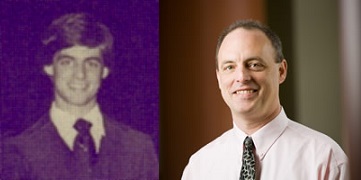
Wright, Ronnie
Ronnie Wright quizzed for Evangel Temple in Decatur, Georgia from 1974 to 1978. His first year at nationals, in 1975, they placed sixth. However in both 1976 and 1978 they won the national championship. In 1978, Ronnie was also the top scorer. (We don’t have complete individual data from the other two years).
His former teammate, Rhett Laurens, said of him, “Ron (or Ronnie as he was known back then) played a key role in both of the national championships that Decatur won in the late 1970s. He was a go-to leader on 20s and 30s and always kept his cool even under intense pressure. He wasn’t a showy or flamboyant quizzer, but instead had a quiet, confident manner about him that provided his teammates with the calm reassurance and steady leadership that was pivotal to their success. After winning both the national team championship and the top scorer trophies in 1978, Ron could have quizzed another year under the eligibility rules at the time, but he made the difficult decision to “retire” and thus became one of the few in quiz history to be able to end his quizzing career at the very top of his game.”
Ronnie went on to a very successful academic career, eventually graduating from Yale Law School. He is currently a Professor of Law at Wake Forest School of Law in North Carolina.